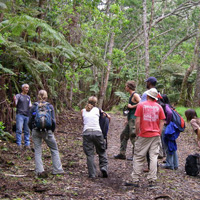Prospective Students
Quick Links
Frequently Asked Questions
1. What are the career opportunities in Natural Resources and Environmental Management (NREM)? Can I get a good job with a NREM Bachelor’s of Science degree?

NREM-related careers span a wide range from traditional occupations like soil conservationist, forester or regional planner to emerging opportunities in environmental quality, coastal resource management, and sustainable development. In general, environment-related employment is expected to increase in coming years. Browse the links at NREM’s Career Help to find out about the many possibilities. With a bachelor’s of science degree, starting salaries average about $35,000 per year but can be significantly higher in some specializations. And you’ll grow in your first job to gain more work experience, technical expertise and management skills. Your salary should grow with your capabilities.
2. What classes should I take in high school to prepare for college studies in NREM?
Take a regular college preparatory program that includes the natural sciences, especially chemistry, biology, and mathematics through trigonometry or pre-calculus, plus the other courses required for admissions to UH Manoa. If available, high school students should consider taking an environmental science class, joining an environmental club or volunteering with a community group to become familiar with the field, get some hands-on experience, and network with like-minded peers and professional people.
3. Instead of entering UH Manoa as a freshman, can I go to a community college first? If I go to a community college, what classes should I take?
Prospective NREM students can go to a UH community college and complete lower division (100-200 level) courses that meet UH Manoa general education and NREM B.Sc. degree requirements. Before registering at a community college, we recommend that you consult with an advisor at their counseling office who can help you plan a program study. Let the community college advisor know that you’re interested in transferring into the NREM program, and go over B.Sc. requirements with them. If you enroll at a college outside the UH system, see our advice for transfer students. When you’re ready to transfer to UH Manoa, be sure to specify the NREM major on your admissions application form so that we’ll know you’re coming.
4. I’m not sure that I want to go to college for four years and get a bachelor’s degree. Can I still get a job in natural resources and environment?
Usually a bachelor’s degree is the minimum education required for scientific, specialist, managerial or professional positions involving natural resources or environment. But there are many other jobs available for production workers, technicians, and service providers. The University of Hawaii has developed pathways in career and technical education with 2-year and 4-year degree options. NREM is part of the Natural Resources pathway, which has a variety of occupations at different levels of training. Some postsecondary education is required for most technical jobs. Besides providing classes in basic subjects, UH community colleges (CCs) offer technical training in selected natural resources/environmental areas. The ones most closely related to NREM include:
If you’re interested in one of these programs, contact the program coordinator or a community college counselor for more information.

5. Besides NREM, what other environmental degrees are offered at UH Manoa? What’s the difference between the programs?
UH Manoa has various undergraduate degrees related to the natural environment. One important difference is between a Bachelor’s of Arts (B.A.) and Bachelor’s of Science (B.Sc.) degree. B.A. programs typically require 30-60 credits for the major and provide breadth of understanding within a given field. B.Sc. degrees require (approx.) 60-90 credits with greater depth and more exacting requirements in scientific and research methods, technical training, concentration area, management and other applied skills, and/or special experiences like an internship or student research project. The NREM Bachelor’s of Science degree requires 75-76 credits and includes all these elements. Another key distinction is between a disciplinary degree in a single subject like Botany or Geology, and interdisciplinary programs which combine learning from different fields to prepare students for professional careers. Because students must take courses in varied subjects, an interdisciplinary major may require a lot more credits than a disciplinary one. NREM is part of the College of Tropical Agriculture and Human Resources, which is noted for its interdisciplinary degree programs. Other environment-related interdisciplinary degrees at UH Manoa include Environmental Studies (B.A.), Geography (B.A.), Ethnobotany (B.Sc.), and Global Environmental Science (B.Sc.). Each program has its own approach and emphases in studying diverse aspects of the natural world.
6. I’m currently enrolled at UH Manoa. But I haven’t decided on a major yet, or I’m unhappy with my current major. Can I transfer into NREM and still graduate on time?
NREM accepts transfers from other UHM programs if your GPA is 2.5 or higher. If you’re a sophomore, you can probably complete the NREM B.Sc. degree in 2-3 years. Since NREM’s lower division requirements are the same (or nearly so) as other biological or environmental sciences, even juniors and seniors can transfer major and graduate in good time. If you’re considering to transfer, consult with the undergraduate advisor in your current major, or with Arts and Sciences Advising Services if undeclared. They can check your academic progress to see how close you are to completing a degree there. Also get a copy of your Star transcript and compare it with NREM degree requirements, and think about what track specialization you’d like to do. NREM may accept courses that you’ve already taken as a specialization elective or substitute for a core requirement. Finally, contact NREM’s undergraduate advisor to discuss your case and start the paperwork to transfer major.